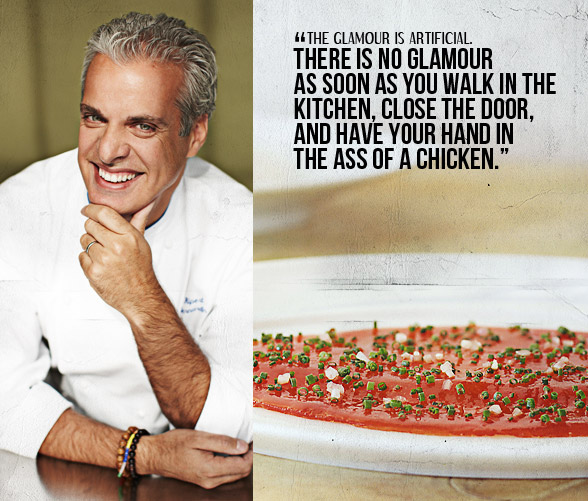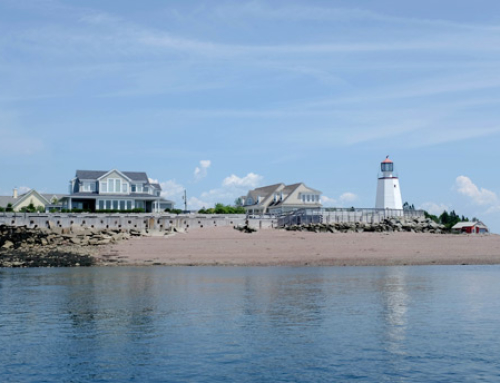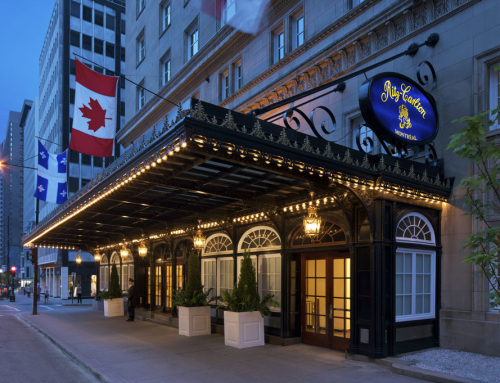It’s one hour till the Good Vs. Evil show with Anthony Bourdain and Eric Ripert begins, and I’m heading backstage Toronto’s Sony Centre for the Performing Arts to interview Ripert, chef and owner of the renowned New York seafood restaurant Le Bernardin. The stars and crew have just arrived from Hartford, Connecticut and appear weary. Ripert looks amongst the most lively of the group, showing no signs of fatigue as he smiles and pulls out a chair for me to sit.
There’s an ease about Ripert that immediately strikes one as he begins to speak, and an unaffected mannerism when he speaks of his passion for food and the culinary industry. The tranquility that seems to be flowing through the chef is not quite what one would except from one of the world’s best chefs with a restaurant boasting three Michelin stars, at least not if one has ever watched the BBC’s documentary series Boiling Point starring a young Gordon Ramsey.
The polar opposite of those brash and abusive chefs in front of the camera on seemingly every food-based reality TV show aired (including the contestants of Bravo’s Top Chef, which Ripert often appears on as a guest judge), it’s obvious what side of the scale the Good Vs. Evil tour has recruited Ripert to represent. Known for fostering a Zen-like kitchen at his restaurant in New York — where everyone from him to the sous chef to the commis (a kitchen newbie who may still be in training) are to be addressed as “Chef” during service — it’s not just the Buddhist prayer beads around his wrist that give Ripert his aura of serenity, it’s Ripert.
http://www.youtube.com/watch?v=IwA0WT7rAtY&feature=player_embedded
With a resume that lists credentials including the position of Chair of New York’s City Harvest’s Food Council, a local food rescue organization; an Emmy award-winning television series, Avec Eric, on PBS; four popular cookbooks; a four star rating from The New York Times, that has carried over a record number of years dating back to 1995 (when Ripert was only 29 years of age); and, how could we forget, a knighthood in the form of the Legion d’Honneur, France’s highest honor, there’s no reason for Ripert to be modest, but modest and humble remain the best adjectives to describe Ripert.
Ranked the 19th best restaurant internationally by The World’s 50 Best Restaurants list, Le Bernardin — where Ripert has been since 1991 — is a restaurant owned and run by a chef crowned with not only critical acclaim, but even more rare, the sterling reputation of existing as a near anomaly in an industry dominated by ego and temper. Below, Ripert talks culinary inspiration, kitchen philosophies, and evolving in the era of the Food Network.

I’m not sure how familiar you are with Toronto, but the city’s seen a huge spike in its dining scene over the past 2 years, with two big name NYC chefs setting up shop here…
Yeah Momofuku, right?
That’s right. Do you think that it’s safe to say that Toronto is amongst the elite cities in the dining world?
You know, every big city is becoming a big dining city. There are more and more people interested in food, and, first of all, more talented chefs opening places, and [also more] specialized stores, in cheese and meats and so on. I don’t know Toronto too well, but I suspect it’s following the trends we see in the US, which is every city becoming very diversified with a lot of good food, and actually with a very good audience [that is] passionate about food.
Would you ever consider a Toronto outpost of Le Bernardin?
Too lazy. (laughing)
Fair enough! Speaking of the elite dining cities of the world, are there any cities that you’ve visited that you would consider hidden gems or up-and-comers culinary-wise?
Each time I go to Japan or Asian, I’m fascinated by the food, but I just got back from Scandinavia, and in Stockholm, I had some really good food. I was in Stockholm in 1982, and I couldn’t say it was that amazing at the time.
It’s changed then?
It has changed a lot. There are a lot of very passionate chefs that are there. And all over Scandinavia it’s happening.
You’ve been at Le Bernardin since 1996, and remain the best seafood restaurant in the world…
Oh no, it’s all relative…
Based on the acclaim, I don’t think it’s an exaggeration. How do you continue to evolve your menu, and where do you find inspiration?
I think if we consider cooking artistry, inspiration would come from the surroundings. For instance, here in Toronto you have so many different ethnicities, inspiration will come from what you see at the market, the food you eat, learning techniques from other chefs and so on. It is the same for us [at Le Bernardin]; we are very in the present in a sense, and are inspired by what is happening in New York. And, I am also lucky that I travel, it translates into new dishes all the time.
Based on your own experience, do you feel like chef owned restaurants have an advantage? Currently, they seem to be amongst the most successful.
When you own the restaurant, you do whatever you want. (laughing) So it’s a big difference from being an employee of someone telling you what to do.
I imagine there is a lot of back and forth about menu choices and the running of back of the house, unless the owners give you carte blanche, which is rare.
It’s very rare…that’s why we see a lot of chefs opening small places because they don’t necessarily have a lot of money, however they want freedom. So, we see a lot of small places everywhere, and I suspect, they will do well with those small places, they will grow and potentially one day be bigger places and more luxurious places. It’s the story of Le Bernardin.
Really?
Yes, it’s actually a full circle. In 1972, Gilbert and Maguy le Coze — the original owners — opened Le Bernardin in Paris with 20 seats, himself [Gilbert] in the kitchen and no decor, and today Le Bernardin is what it is.
I’m guessing you prefer owning the restaurant as the chef then?
Oh, there is no doubt! (laughing) I mean, sometimes in a recession you are not so excited but….

Last year in Toronto, over a thousand restaurants opened, a record number for the city, also the average age of students at cooking schools are going up with people leaving their careers to pursue a new career as a chef. It seems hard not to link this all to the popularity of the Food Network.
Yes of course. So you have your own Food Network here?
We do.
So you get Paula Dean?
I think we get her here…
So Paula Dean is known here?
Yep…I’ve seen her show. I think the most popular show though is Top Chef Canada, and we’ll be getting Chopped soon.
Oh good…but Paula Dean is popular?
Yes, yes I think she is…
Wow…okay.
You seem very curious about her, what do you make of Paula Dean?
No, no just asking. (laughing) No comment.
What do you make of the Food Network phenomenon, and all these people who want to be a part of the industry now?
It’s an interesting phenomenon, that is ultimately positive. It’s creating more excitement and interest in food, and I will give you an example of that: 20 years ago if you were trying to find fresh basil in Toronto or New York…good luck. (laughing) Now you have so many stores with this…in January you have fresh basil…in a pot…growing! So there are positive influences, for the industry and on the [public] mentality as well [when it comes to] eating better.
Eating habits are definitely changing and evolving.
And, I think that the fact that Canada and American are countries full of immigrants coming with their own culture — as you know Europeans love food, but Asian as well loves food — I think that also makes a difference.
Any advice for lawyers and computer software professionals who are considering stepping away from their current careers to pursue their passion for cooking?
Well, look, if you want to become a chef, you need to know that it’s not glamorous, you don’t make a lot of money necessarily, you’re not going to become rich necessarily, it’s very tough…you really have to have the passion for cooking, true passion. If I have to give them advice: you should go to restaurants, look around, spend some time working for free and train, and then if you really really think you can do it after a few months, then go to culinary school.
That’s good advice. The industry can look very tempting and not as tough as it really is to those on the outside.
That’s the negative aspect of it, the glamour I see…the glamour is artificial. There is no glamour as soon as you walk in the kitchen, close the door, and have your hand in the ass of a chicken.
Well put! How did you find the balance between your career and the rest of your life. It’s a demanding job, especially when it comes to time.
Everybody has his own way of working, I find the balance like this…I wouldn’t call it my day, I would call it my journey, and my journey is divided in three: 1/3 is work, 1/3 is family, and 1/3 for myself. It works well for me, it’s a good balance.
Published May 10, 2013











